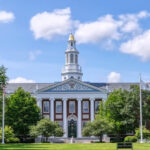Livin’ La Vida Sonia
While Senate leaders discussed when the confirmation hearings for Judge Sonia Sotomayor would take place, a panel hosted by the American Constitutional Society on June 10, 2009 debated the issues surrounding the controversial nominee.* Moderator Dahlia Lithwick, a senior editor and correspondent for Slate magazine, began by asking the panelists to define and discuss terms such as “judicial activism” and “empathy.” Cristina Rodriguez, Professor of law at New York University School of Law, argued that “judicial activism” refers to instances “when a court strikes down an action by the political branches of government.”
Rodriguez acknowledged that “it is perfectly appropriate for judges to strike down the actions of the political branches of government in some circumstances,” but said that the debate is “when it is appropriate for judges to be activists.”
M. Edward Whelan, III, President of the Ethics and Public Policy Center, argued that “the effort to make [the term judicial activist] neutral … is depriving it of the stigma that it’s properly earned over the decades.” Instead, Whelan defined the term “judicial activism” as “the wrongful overriding of democratic enactments, generally through the invention of supposed constitutional rights.”
With regards to “empathy,” Whelan argued that “to the extent that the term … is loaded, it is President Obama who has done the loading.” Whelan also expressed concerns about Sotomayor’s ruling in Ricci v. DeStefano, a case involving the employment tests of white firefighters from New Haven, Connecticut. “[Sotomayor and her colleagues] were discounting the value of the work of firefighters[.] … [R]acial quotas were being elevated over public safety.”
Wade Henderson, President and CEO of the Leadership Conference on Civil Rights, “deeply resent[s] the implicit double standard that is now being applied by some of [Sotomayor’s] critics … and I’m specifically speaking now of people like Karl Rove, Newt Gingrich, Tom Tancredo.” Henderson argued that they “need to be challenged on the issue and they need to be asked to repudiate their positions.”
Rove previously expressed the opinion that “[Sotomayor] could be even more liberal than David Souter,” while Tancredo has said that Sotomayor “appears to be a racist.” Gingrich had already retracted his statement before the panel took place, acknowledging that he should not have called Sotomayor a “racist.”
Rodriguez said that “[Sotomayor] is going to have much more freedom on the Supreme Court” because the Court will be “answering questions largely of first impression.” Sotomayor will therefore not be “bound by past precedent” which “constrains Court of Appeals judges.”
The panel also discussed Sotomayor’s opinions in various other cases. Wheelen argued that Sotomayor “adopt[ed] a novel equal protection theory that would severely impact the role of police” by siding with the dissent in Brown v. City of Oneanta, a case involving a police sweep of young black men when there was a reported attack on an elderly woman.
Rodriguez noted Sotomayor’s dissent in Ford v. McGinnis, which involved a Muslim prisoner who was not allowed to observe a Muslim feast. Sotomayor wrote in her dissent that “what matters is…what the prisoner subjectively thinks is an important Muslim feast.”
In the case of Croll v. Croll, which involved a provision of the Hague Convention relating to child abductions, Sotomayor’s dissent fostered “debate about the extent to which foreign court’s judgments matter.” “Some foreign courts had not interpreted this particular provision of the convention in a way that would not have supported [Sotomayor’s] view,” Rodriguez said.
Though Sotomayor’s judicial record is extensive and varied, all three panelists agreed that her rulings are subject to many interpretations. The most challenging aspect of Sotomayor’s confirmation hearings could prove to be heeding to the suggestion offered by Henderson: “Let [Sotomayor’s] record speak for itself,” he said.
*E.D. Judge Sonia Sotomayor’s confirmation hearings before the Senate Judiciary Committee are currently scheduled to begin on July 13, 2009.
Brittany Fortier is an intern at the American Journalism Center, a training program run by Accuracy in Media and Accuracy in Academia.





